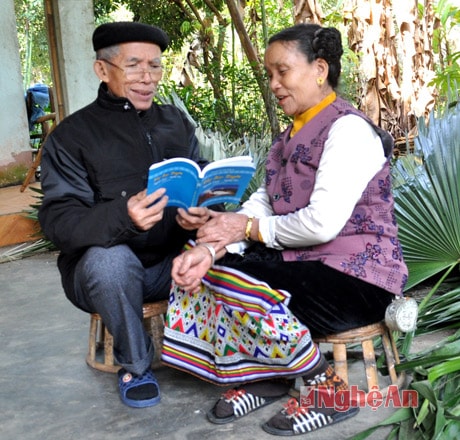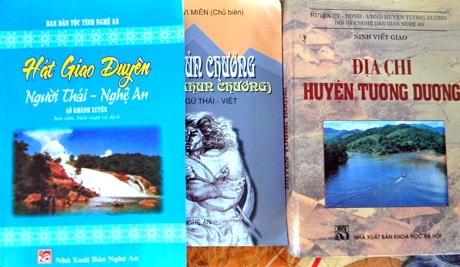Contributor to the flow of Thai folk songs
(Baonghean) - He has appeared in newspapers as a character with the title "the person who preserves the Thai language", and sometimes as the author of an article about the culture of his people. And recently, former teacher Lo Khanh Xuyen released the book "Thai folk singing", the result of many years of hard work and dedication, which is also the source of material for him to inspire the members of the Thai Folk Music Club, Que Phong district, of which he is the head...
The small house in Don village, Muong Noc commune, is located next to the village road, which is rumbling with the sound of vehicles and machines making new rural traffic. The late winter sun shines through the green canopy of trees, and the yellow scent of flowers fills the yard where the village elder is busily writing notes. Lifting his glasses, he smiles kindly at the guests, former teacher Lo Khanh Xuyen quickly brews tea...
 |
| Mr. Lo Khanh Xuyen and his wife in Don village |
I remember meeting him at the beginning of the year at a conference of village elders, a prestigious person in Vinh City, I asked for an appointment to go to his hometown one day to talk about the treasure trove of ancient Thai scripts that he and some other dedicated collectors are diligently preserving... At the age of 78, whenever I touch on memories, I am overwhelmed with feelings of those far from their old land, sometimes forgetting something worth remembering, always blaming myself for being indifferent, waiting for the opportunity to hold on to the shirt of a soul mate and pour out my heart, as if it were a flowing stream, like a thousand winds. Therefore, now I do not want to bring up his orphaned youth in Pieng Chao, the village of Quan Lang of Chau Kim commune, at the foot of the mythical Nine-Room Temple anymore...
It has been 30 years since he retired from the position of Head of the District Education Department to have time to start implementing his big project of collecting and preserving the ancient Thai script that is in danger of disappearing in the Thai community in Nghe An. His familiar steps of wading streams and crossing passes when he was a young teacher until he became the longest-serving Head of the District Education Department (from 1964 - 1983) brought him to all the Muong villages throughout Western Nghe An, immersing himself in the gong festivals with blazing forest fires, confidants with shamans to preserve many Thai cultural values that, according to him, once flourished no less brilliantly, have now sedimented, with a distant "margin" of ancient capital.
The regrets mixed with sadness when holding in his hands an ancient Thai text that was somewhat decayed, the extreme joy when collecting an ancient song from a shaman in a remote area... he silently spread them all on the pages when participating in compiling and writing for dozens of books about the history, legends, land and people of Western Nghe An in the cultural flow of his people. And now, he has in his hands a rather thick book of his own!
Teacher Lo Khanh Xuyen flipped through the book "Love Songs of Thai People in Nghe An", then softly sang:
"Make the gift fade, the frog will be buried in the ground."
Clam soup wrapped in a large, round, and fragrant mussel dish.
Wrap the ivory-leafed conical hat with a pomelo leaf...”.
(Come here with friends and relatives)
Come here beautiful flowers
Who knows who to send my love to...
And then, he took me back to the nights of wine festivals with the flickering firelight; or the nights of weaving in the whispering of the late night stream under the bright moonlight of the forest. And in the midst of that passionate excitement, in that enchanting invitation, the passionate love songs of the local boys and girls seemed to never end. More than the love between men and women, more than the desire to express feelings before the constraints of customs to come together, to be passionately together until the day they can live together as husband and wife, "love songs (of the Thai people) also show the unique characteristics of an ethnic group living in the highlands with little contact, with a gentle, discreet, and emotional personality. Modestly expressing sincere, sincere feelings with smooth, tender lyrics with metaphors, metaphors from far to near...".
The love songs of the Thai people in particular, as well as folk songs and proverbs in general, all have appropriate spaces and settings for expression. Teacher Lo Khanh Xuyen said that nowadays, many songs that talk about daily delicate behaviors or encourage the spirit of work are almost simply ancient capital that needs to be preserved and are no longer popularized; for example, the old stilt houses are often simple, with gaps in the floor so that there is a song to remind (translated): "When spitting, you must look at the gaps in the stilt house/When squatting, you must look at the pants and skirt you are wearing". Then, when the brocade weaving craft is gradually disappearing, now there are few nights when the village girls weave under the moonlight and sing "Invite the moon down, moon...", or sing by the blazing fire for the whole village to hear, their thoughts absorbed in the needle and thread: "I wish you were the shuttle so I could thread the thread to weave a beautiful piece of fabric...".
The memories of former teacher Lo Khanh Xuyen suddenly went back further to around 1955, when his first-level teacher training class met Uncle Ho in Hanoi and heard him advise: "We must unite and study well to expand our homeland, so that our people can catch up with other peoples." That advice followed him throughout the following years, and in the process of collecting Thai folk songs, he realized that there was a very high cultural value in them. If they were fully collected and systematically preserved, they would become a precious heritage, a treasure trove of selected literary language, thereby contributing to helping the Thai ethnic community integrate literature and culture equally with the cultural flows of other peoples. That thought was also imbued in him from the teachings of his father: "The old customs of the past must be preserved for the future/Do not let the customs of the past be forgotten."
Former teacher Lo Khanh Xuyen and his wife have 8 children, all grown up, working hard and attached to the village. They now live simply in a small village, waiting for their children and grandchildren to come home to reunite. Occasionally, he flips through ancient texts and songs he has collected to sing and explain to his wife. His health is weak, his legs can no longer travel far and near, once a month he presides over the activities of the Que Phong Ancient Folk Music Club.
The club was established in October 2012, with 18 members aged 60-75, all of whom are passionate about singing and composing Thai folk songs. The silver-haired people gather together, sing new compositions to each other, practice their voices, play the Khen tune... so that on the occasion of Lunar New Year, New Rice Festival, Nine-room Temple Festival, and other festivals... they can gather to pass on the old melodies, sing new lyrics to criticize bad habits, and evoke the beauty of everyday life. The club also coordinates with local schools to send talented and passionate students to learn nhuon, xuoi, and musical instruments; focusing on giving them access to ancient words to persistently revive the way of singing Thai folk songs of the young generation who have "gone" too far from the old melodies. It is expected that in 2014, the club will select a number of members to propose to the State to recognize the title of "Folk Artist". Those "singers" must have a certain level of knowledge, be able to improvise literary language well, and be able to read Thai.
 |
| Some books that Mr. Lo Khanh Xuyen participated in compiling or editing. |
As the person responsible for collecting, compiling and translating (into Vietnamese) the book Hat giao duyen nguoi Thai Nghe An, former teacher Lo Khanh Xuyen considers it the result of many people. The book is also a document for members of the Que Phong District Folk Music Club to refer to, enrich and strengthen their activities, from which they can continuously contribute ideas to improve. Holding in my hand the book of more than 160 pages, carefully compiled with Thai transcriptions, Vietnamese translations of meeting songs, love songs, songs to the forest... I silently wish that the collector and researcher Lo Khanh Xuyen will be like an ancient lim tree in the forest, the older it gets, the stronger its precious wood core, the more shade it provides to pursue more thoroughly the goal he has in mind: We must urgently, very urgently, preserve the ancient music and folk songs of the Thai people of Nghe An.
Sam Temple






